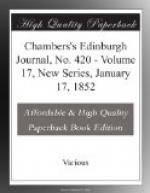In 1819, he was sent by government to Spain, where the yellow-fever had broken out, and his report upon its characteristics has been universally admitted to supply the fullest information on the subject that had hitherto been communicated to the public. He availed himself of his presence in that part of Europe to pay a visit to Constantinople and the Levant; and, retaining his energy to the last, when a British force was sent to Portugal in 1827, he desired permission to accompany it. The sands of his life, however, were then fast running out, and on the 6th of April in the same year he died, after a short illness, at Thursby, near Carlisle, in the 77th year of his age. Thus closed a long career of usefulness; for it is not too much to say, that few men of his time laboured harder to benefit his fellow-creatures than did Dr Robert Jackson.
* * * * *
[Footnote 2: The late Admiral Sir Edward Codrington, when in command, during the war, of a frigate on the coast of Calabria, finding sickness appear amongst his crew, purchased on his own responsibility some bullocks, for the purpose of supplying them with fresh meat. Lord Collingwood having heard of this, and considering it a breach of discipline, sent for Codrington, and addressed him: ’Captain Codrington, pray have you any idea of the price of a bullock in this place?’ ‘No, my lord,’ was the reply, ’I have not; but I know well the value of a British sailor’s life!’]
THE MYSTERIOUS LADY.
It is thirty years since we first met the Mysterious Lady at a fashionable sea-side boarding-house, and on our introduction, we found that her brother, General Jerningham, was well known to some members of our family. For five-and-twenty years afterwards she haunted us at intervals; and so singularly and secretly conducted were all her movements, that had she lived in the days of the Inquisition, Miss Jerningham might have proved one of its most valuable agents and coadjutors. She was a thin, middle-aged personage, or, more correctly speaking, of uncertain age, and without anything remarkable in her exterior, which was decidedly lady-like, if we except a pair of the very smallest and most restless brown eyes that were ever set in mortal’s head. These eyes expressed suspicion, together with intelligence and close observation. They were clear and sparkling, and shaded by no drooping fringes; and some folks declared that Miss Jerningham slept with her eyes open. On conversing with her, she appeared to have been everywhere and to know everything; but the moment any allusion was made to the future, any attempt to discuss her prospective plans, then did the little brown eyes assume a reddish tinge, their expression passing from suspicion and alarm to the most stubborn resolve. All this was somewhat ludicrous, because nobody really felt particular interest in her movements, or desired to pry into her actions;




